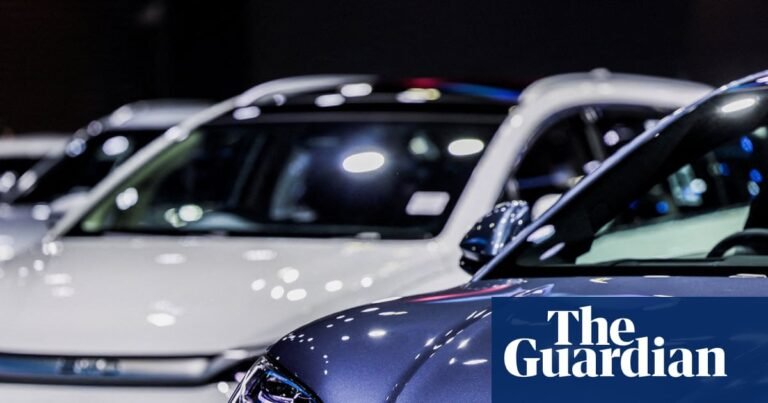Chinese carmakers led by BYD reported big jumps in UK sales last month, despite a declining overall car market, including a 59% slump in sales from their electric vehicle rival Tesla.
BYD sales quadrupled year on year to reach 3,200 in July, even as overall sales of all types of car declined by 5% to 140,000, according to data published on Tuesday by the Society of Motor Manufacturers and Traders (SMMT), a lobby group.
The car industry has said it is struggling with a weak economy, which is holding back consumer spending.
At the same time, carmakers are waiting for clarity on which models will be eligible for subsidies of up to £3,750 under a new grant scheme announced by the UK government last month. The government on Tuesday said that four Citroën models would be eligible for the grant.
Chinese carmakers will not qualify for the UK electric car grants because they rule out cars from countries with carbon-intensive electricity grids. However, that has not so far stopped Chinese manufacturers from targeting Britain, which is one of the most lucrative car markets in Europe.
BYD, which is competing with Tesla to be the world’s biggest maker of battery electric vehicles, has launched an aggressive sales push in the UK, undercutting rivals on battery cars. Its sales increased sixfold during the first seven months of 2025 compared with last year to 22,600.
Chery, a Chinese state-controlled manufacturer, has launched 19,000 vehicles in Britain in 2025 under its Omoda and Jaecoo brands, compared with zero last year.
America’s Tesla, run by Elon Musk, was the first electric brand to make a major impact in the UK. However, its sales during the first seven months of 2025 have dropped by 7% compared with the same period a year earlier. Analysts have been closely watching its progress because of the political backlash against Musk after his short-lived but divisive alliance with Donald Trump.
Tesla’s July sales fell by 60% year on year to fewer than 1,000, although the carmaker’s sales can be volatile depending on the timing of imports to the UK. The sales drop came despite the launch of a refreshed version of its flagship Model Y vehicle.
Not every Chinese carmaker recorded an increase in sales. MG, a historical British brand, has been reinvented as a maker of electric cars and hybrids under the ownership of SAIC, another of China’s four large, state-owned carmakers. MG’s sales fell 10% year on year to 5,600, making it the 12th biggest car brand in the UK so far this year – as well as the biggest Chinese-owned brand.
skip past newsletter promotion
Sign up to Business Today
Get set for the working day – we’ll point you to all the business news and analysis you need every morning
Privacy Notice: Newsletters may contain info about charities, online ads, and content funded by outside parties. For more information see our Privacy Policy. We use Google reCaptcha to protect our website and the Google Privacy Policy and Terms of Service apply.
after newsletter promotion
Other Chinese carmakers have also started to sell cars in the UK, but in much smaller numbers than MG and BYD. Xpeng finally launched in the UK in February, but it has sold only 164 of its premium electric vehicles in the first seven months of 2025, while Leapmotor has sold 790 through a partnership with the Vauxhall owner Stellantis.
Others have sold even fewer cars in the UK so far. Skywell – a partnership between the Chinese consumer electronics company Skyworth and bus maker Nanjing Golden Dragon – sold five cars in the UK in July. The company’s website boasts that its SUV offers “exclusive space, great pattern”, an “all-round health and pleasure cockpit” and a “novel hugging seat”.
